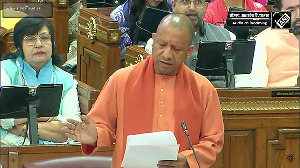Apart from food, Mike Gatting had a famous appetite for spinners.
Don't let Shane Warne's ball of the century cloud the mind; that was a beauty, even a good reader of spin could not spot. But Gatting, who made cricket look like a recreation sport, did have the footwork, strength and attitude to bat spinners out of the attack. So much so that Ravi Shastri once had a 7-2 on-side field to keep him under control.
 Not for nothing does an English batsman average over 50 in India. 'Gatt', who made his Test debut in Pakistan, considered the toughest of tours during the 80s, went on to score his first century, 136, in Bombay. India played three spinners -- Shastri, L Sivaramakrishnan and Shivlal Yadav in the game and won the match by eight wickets.
Not for nothing does an English batsman average over 50 in India. 'Gatt', who made his Test debut in Pakistan, considered the toughest of tours during the 80s, went on to score his first century, 136, in Bombay. India played three spinners -- Shastri, L Sivaramakrishnan and Shivlal Yadav in the game and won the match by eight wickets.
Now in India on media duties for the England tour, Gatting was happy with the way his countrymen have tackled the likes of Anil Kumble and Harbhajan Singh. The approach of batsmen like Alastair Cook, Kevin Pietersen, Paul Collingwood and captain Andrew Flintoff has been a revelation on the tour, he feels.
"I think it's players throughout the world," said Gatting, during the Mohali Test. "England and India are just coming from a series in Pakistan and if you see there have been very few wickets for the spinners on either side, be it [Danish] Kaneria or Anil or even Harbhajan. I think people over the world are playing spinners much better than they did.
"For example some of the England players have come down to India, to Bombay, with the World Cricket Academy, looking out to play more spin. First they were more interested in playing seamers.
| |||||||||||
If spin has been the English enemy historically on the field, upset tummies and the hot and humid conditions have been the off-field hazards.
Their constant complaints of Indian food and climate have also confirmed them as the biggest whiners in the game.
Gatting, a former England captain, thinks that touring teams have to take such problems in their stride rather than letting it upset them.
"When you are in a country, when you go in any different part of the world, the water's different, the smells and different the cultures are different. But you kind of acclimatize to it you can enjoy yourself.
"I think it is a shock to some people. You got to come over expecting to get a little bit ill. For some reason or the other I'd always snooze in the afternoon, which is ridiculous. It's just the time difference and it does take a week or two to get it out of your system.
"I just think it's a question of how you're prepared for it and how well you understand it. It's a case of putting it in your mind and getting on with it rather than saying it's a horrible place. It isn't."
A lot was being made of the English team being restricted to the team hotels on their tour of Pakistan last year. But Gatting, 48, believes it should have inculcated better team spirit within the team rather than the players "getting on each others nerves".
"So you have to stay in! There are all sorts of things they can do now; they have the DVDs and Playstations. Sometimes people just get blinkers on and they don't appreciate what's around them."
Coming back to the Indian tour, he felt England has unearthed two good prospects in Cook and Monty Panesar. He also believes that India's charge in the last session in the Nagpur Test had actually given England a glimmer of hope for a win.
"Watching the last session, where India had a dash at it, Harmison was asked by Flintoff, 'mate you've got to come and help me out here', and he really did. He charged in and made sure the situation didn't get out of hand.
"Andrew was happy that India were going after them on a good wicket. He called upon himself and Harmison to do the job and they stemmed the flow so much so that the boys decided to come off for bad light."
Gatting, who has 4409 runs in 79 Tests, added that England's set of bowlers, including the bench, is their strength. And as they showed in the Nagpur Test, even the seamers could do the trick on flat wickets.
"But, yes, it is interesting to see how they will go on from here," he concluded.







 © 2025
© 2025